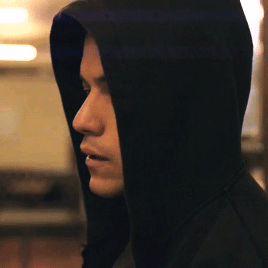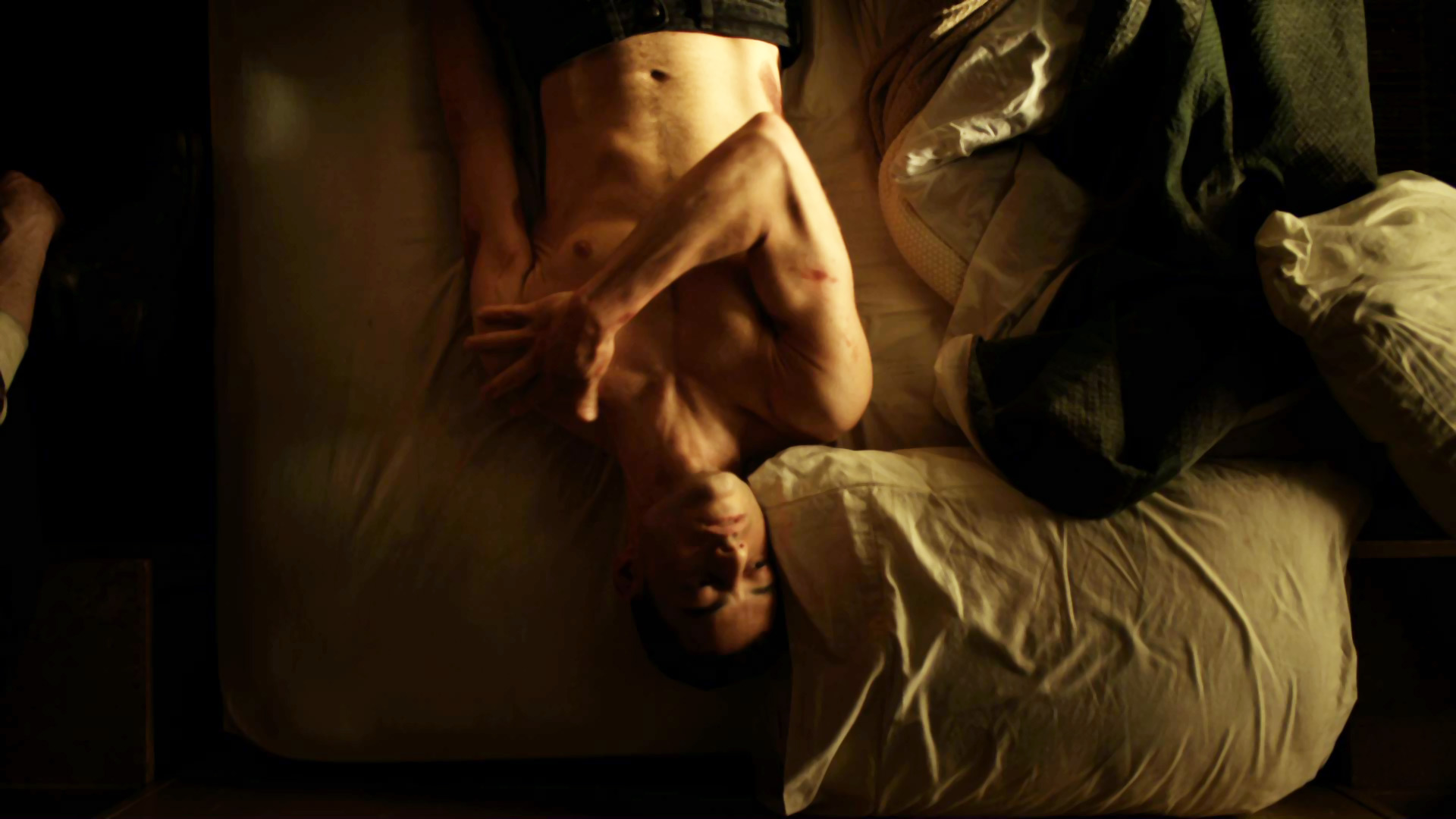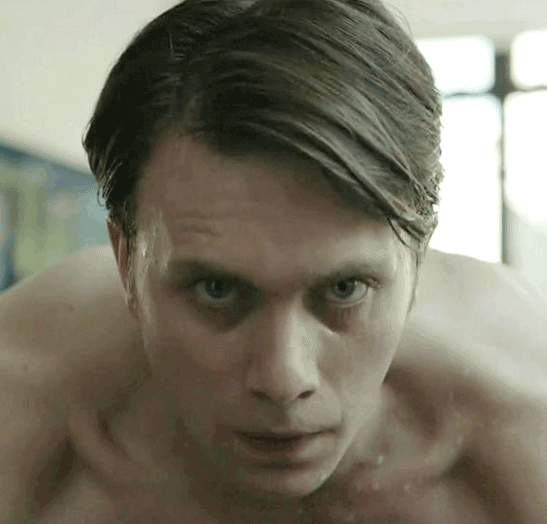 Welcome readers to a new series, currently without a name (help?), in which various members of Team Experience will be discussing a television show or shows each Tuesday. It's our way of expanding our horizons a bit but without drowning the site in TV or limiting us to only one show as has previously been our habit with "Mad Men" or "American Horror Story". To begin, please glance furtively around, turn up your paranoia sensors, and slip into something uncomfortable with us as Lynn and Nathaniel discuss the somewhat menacing pair of "Mr Robot" (USA) and "Humans" (AMC).
Welcome readers to a new series, currently without a name (help?), in which various members of Team Experience will be discussing a television show or shows each Tuesday. It's our way of expanding our horizons a bit but without drowning the site in TV or limiting us to only one show as has previously been our habit with "Mad Men" or "American Horror Story". To begin, please glance furtively around, turn up your paranoia sensors, and slip into something uncomfortable with us as Lynn and Nathaniel discuss the somewhat menacing pair of "Mr Robot" (USA) and "Humans" (AMC).
NATHANIEL R: Hi Lynn. If you want to know why I'm pairing these two shows it's because I fear we've reached the tipping point of contemporary film and television's obsession with autism or any one on the spectrum thereof (i.e. everyone in our age of staring at our phones instead of each other). Lately I've been thinking a lot about E.M. Forster's Howards End and its edict "only connect" It seems so transgressive now, to demand as much.
This preference for disconnection paired with the still raging epidemic of antiheroes has made the television landscape rather chilly. The danger is that everything starts feeling the same or at least like variations on the same. How radical would a really warm and friendly prestige cable series feel now? I bring this up mainly because, though, "Mr Robot" is confidently acted/written/directed and does feel like its own show... I couldn't stop thinking of "CSI: Cyber"(my deepest apologies) as its sort of brain-damaged country bumpkin cousin because of the cyber crimes that feel like sci-fi and "Dexter" as its more sociopathic father because of the confessional 'i am deeply crazy but I'll attempt to explain myself' narration.
Mostly I bring up "only connect" because I find both shows almost painful to watch; everyone needs a hug. Do you want to hug them? [More...]
LYNN LEE: I want to hug all of the sentient synths on "Humans"! (Well, maybe not Niska - she scares me.) Actually, the fact that I feel more empathy for the androids than I do for the human characters on that show, or, for that matter, on "Mr. Robot," only underscores your point about TV shifting focus to the alienated, disaffected, and sometimes even sociopathic. Somehow I find the plight of the not-quite-human, not-altogether-robots, in their desperation to find each other and avoid enslavement, more compelling than the human who seems to be trying to turn himself into a robot and has convinced himself that society is out to enslave him.
That's no knock on Rami Malek, who's doing a great job portraying an antihero crusader who at once craves and disdains connection with others. Elliott's fleeting, ill-fated relationship with Shayla (Frankie Shaw) - poor Shayla! - and the moment he finally confesses to his therapist (Gloria Reuben) that he's basically drowning in loneliness were heartbreaking attempts to reconcile this contradiction. Yet they also made him oddly repellant, whatever his motives, because of how brutally they blew back on the two women - who also happen to be two of the most sympathetic characters on the show.
NATHANIEL: Absolutely agree on Elliott (Rami Malek) in that I want to connect to him. And yet every time there's a 'way in,' so to speak, like that moment he atypically hugs his best friend Angela (Portia Doubleday) or when he adopts that adorable dog "Flipper" on a whim, the show immediately punishes me for feeling warmly towards him because he promptly pushes both away or ignores them.
LYNN: Interesting that you referred to other TV shows in your intro, as I've been struck by how openly both "Mr. Robot" and "Humans" seem to be borrowing from popular movies. There's a strong Fight Club vibe in Elliott's relationship with Mr. Robot (Christian Slater), who may or may not be a figment of his imagination, and the vaguely anarchic, anti-establishment aims of F Society; and an even more surreal American Psycho subplot going on with Elliot's other foil, Tyrell Wellick (Martin Wallström). Meanwhile, "Humans" owes an obvious debt to the entire canon of A.I. in film - most notably Spielberg's A.I. (and not just because William Hurt seems to be playing an older, sadder, and wiser version of his character in A.I.), but also the replicants of Blade Runner, who were stronger, faster, smatter and just possibly *more* human, in their bond with one another, than the "real" humans with their fractured, dissociated relationships and inability to communicate.
Are there other movies either show reminds you of? And at what point does homage tip into being overly derivative - a common critical complaint aimed at "Humans," but not "Mr. Robot"?
NATHANIEL: I've officially run out of comparison points because you took my last one! "Humans" is more derivative but that's partially because artificial intelligence paranoia/fantasy has been around a lot longer than cel phones or paranoia about privacy in the internet age. It's also because "Mr. Robot" has some really confident stylization happening that helps claim an identity. I particularly love that bold red title in each episode, rather than traditional opening credits, like it's a splash page or a chapter mark. And the show is sufficiently unsettling without working up a sweat since there's very little audience coddling when we're in a flashback or a possible hallucination. "Humans" doesn't have anything comparable in terms of Style or Ambiguity.
 "Mr Robot" is determined to skew your perpectives, keep you dizzy
"Mr Robot" is determined to skew your perpectives, keep you dizzy
LYNN: "Mr. Robot" is stylistically arresting, no doubt about that. It's so skilled at presenting the world from Elliott's skewed perspective that it leaves the viewer feeling perpetually off balance and decentered. Hell, the viewer doesn't even exist, according to Elliott - we're an imaginary friend he made up! Like so much about the show, I can't decide whether that's a brilliant narrative device or an off-putting gimmick. Ditto for the extended hallucinatory sequence when Elliott's suffering severe withdrawal: it's hypnotically filmed, and it also felt like a little too much of a good thing. Or a bad thing, I guess, if you're Elliott; that may be exactly the point.
 NATHANIEL: I'm so glad you reminded me of William Hurt's trial run on his "Humans" character as a man who was instrumental in building synthetic life because I haven't enjoyed the Oscar-winner this much in ages. His role has thus far been mostly limited to one on one interactions with three different individual synths but he plays each of those one-sided relationships differently. His work with his run-down synth () who he's basically repurposed as walking scrapbook is touching and his arguments with Niska, contrasted with his argumnets with the bot that was forced on him as caretaker have a great stern parent/spoiled child reversal; he's the one switching roles.
NATHANIEL: I'm so glad you reminded me of William Hurt's trial run on his "Humans" character as a man who was instrumental in building synthetic life because I haven't enjoyed the Oscar-winner this much in ages. His role has thus far been mostly limited to one on one interactions with three different individual synths but he plays each of those one-sided relationships differently. His work with his run-down synth () who he's basically repurposed as walking scrapbook is touching and his arguments with Niska, contrasted with his argumnets with the bot that was forced on him as caretaker have a great stern parent/spoiled child reversal; he's the one switching roles.
Hurt is especially good with Emily Berrington maybe because she's an actual scene partner since her character, Niska, is fully sentient. That refusal to feel fear in her presence even when she's at her craziest adds such a jolt of tension but not in any way you would expect. Instead of highlighting the "thrills" you'd normally feel when an unstable character is holding a huge butcher knife, for example, you end up with all these ideas about parenting and impulse control and this character (Niska) who had seemed so advanced suddenly reads childish.
LYNN: I think we can agree William Hurt is the best thing about "Humans." And it helps that he seems to be one of the few men on the show who isn't trying to have an inappropriate relationship with the bots!
NATHANIEL: Sex-bots are such a frequent component of sci-fi. That earlier Spielberg/Kubrick fusion basically ignored the sexual element -- Jude Law's Gigolo Joe having no visible feelings about being a sex-bot and Spielberg films being largely asexual entertainments -- whereas this one plays sex up as this evil thing that preys on people's weakest impulses or causes rage. I can't say that I love either approach, as both seem reductive. My favorite sexbot remains "Pris" from Blade Runner because her sexuality is ever present but ambiguous. It can read warm as she's extremely tactile with her "friends" OR menacing (like crushing Deckard with her thighs - ouch)... which seems to me to be a more evolved handling of sexuality than Humans version which is basically "DANGER, WILL ROBINSON!" Seriously, who would want to have sex with these bots? They're all pretty but they look ice cold and they never touch anyone or move like people who'd want to get naked and break a sweat. In fact, can they sweat?
LYNN: The view of the synths' sexuality is indeed limited and rather dark as far as it goes, it's pretty clearly meant to underline the ethical questions raised by having sex with them. Or, as Harrison Ford famously described "Blade Runner," whether it's possible to have a meaningful relationship with your toaster. Someone like Joe clearly would *like* to believe that kind of sex doesn't "count" as cheating or abuse because it's no different than using a vibrator - and yet he feels guilty anyway. More disturbingly, someone like Niska's last "customer" probably convinced himself his pedo fantasies aren't wrong because they're not directed at "real" humans. Of course, this debate becomes a bit of a straw man once you accept that these robots were given the capacity to feel and, by extension, to say no.
 Sexbots are a staple of sci-fi
Sexbots are a staple of sci-fi Niska might f*** you. But then she'd have to kill you
Niska might f*** you. But then she'd have to kill you
NATHANIEL: I'm not sure what to make of the sexuality on "Mr Robot" wherein the sex happens randomly or it's just there in the air in elaborately sick mindfucks between the men. I think Mr Robot (Christian Slater) and Elliott (Rami Malek) could use more of that especially if they're going for a Fight Club dynamic as you suggest. But I absolutely loved that intense scene between Knowles (Brian Stokes Mitchell) and Tyrell (Martin Wallström) when the former offers to get his dick out, calling the other out on his sick games and revealing how crass those head games would play out with actual bodies involved.
LYNN: I'd say its treatment of sex, even more than "Humans," perfectly fits your description of something that "preys on people's weakest impulses or causes rage"! I'm most intrigued, though not in the least titillated, by the sexual dynamic between Tyrell and his Lady Macbeth-like wife.
Where does it go from here, I wonder?
NATHANIEL: That's always the question with television isn't it? And I worry about either of these series in terms of sustainability. They both have these plot goals that feel like end-games but are more likely to turn into hamster wheels, given how television usually plays out.
If you were the showrunner on either, who or what would you award with more attention/screen time and what would you downplay or outright jettison?
 Tyrell is "Mr Robot"s American, no, Swedish PsychoLYNN: That both shows have been renewed for second seasons makes me both glad and worried, for the reasons you state. But they both have potential they haven't quite fully realized, so I'll stick with them for now.
Tyrell is "Mr Robot"s American, no, Swedish PsychoLYNN: That both shows have been renewed for second seasons makes me both glad and worried, for the reasons you state. But they both have potential they haven't quite fully realized, so I'll stick with them for now.
But now let's turn this over to the readers. If you're watching these shows, where would you like to see them go?
